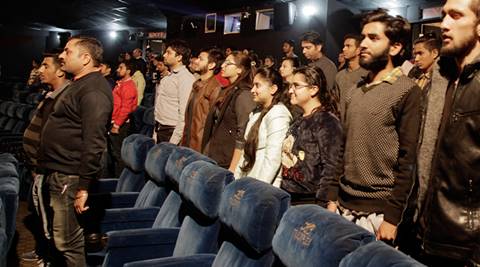Opinion SC Anthem ruling: When patriotism becomes a command performance
Respect cannot be genuine if the only alternative to respecting is to be persecuted and prosecuted.
 Indian movie goers stand up as national anthem is played at a movie hall before the screening of a movie in Jammu, India, Tuesday, Dec. 13, 2016. A ruling by India's Supreme Court last month said that the anthem must be played before every film screening in the country and that audiences must stand. The court said the rule was aimed at instilling a sense of patriotism. (AP Photo/Channi Anand)
Indian movie goers stand up as national anthem is played at a movie hall before the screening of a movie in Jammu, India, Tuesday, Dec. 13, 2016. A ruling by India's Supreme Court last month said that the anthem must be played before every film screening in the country and that audiences must stand. The court said the rule was aimed at instilling a sense of patriotism. (AP Photo/Channi Anand)  Movie goers stand up as national anthem is played before a screening in Jammu. (AP Photo)
Movie goers stand up as national anthem is played before a screening in Jammu. (AP Photo)
Shortly after Maharashtra Navnirman Sena targeting Pakistani artistes, the honorable Supreme Court once more demonstrated that cinema is a soft target for all concerns nationalistic. Days after it forced the patriotic pill down our collective throats by making the playing of national anthem and standing to it mandatory before movie screenings in all cinema halls, 12 people have been detained during the International Film Festival of Kerala for not rising and 8 people, who chose not to rise in opposition, got beaten up in a Chennai cinema hall by a mob of 20. Both groups charged included women.
Many of the people who are choosing not to stand, like the attacked group of 8 in Chennai, are doing so not because they do not love and respect their country or the national anthem, but because they are opposed to the honorable Supreme Court arrogantly thrusting its idea of nationalism on them. Even if one has been proudly standing for the national anthem in the past, the flavour of that expression has been modified – no longer driven by will or national fervour, it has assumed a consequential form — mandatory for self-preservation.
From the beginning, it has been unclear who actually is the enforcer of this directive of the SC: The cinema hall staff? The police? Perhaps, because these other options are not practical in terms of numbers, it has been left to the ‘patriotic’ citizens to go after the seated ‘anti-nationalists’ using any means available at their disposal, no matter if they be ill, pregnant, old or disabled (The disabled who cannot stand have been exempted from doing the literal impossible, but the SC is to come up with appropriate, ‘respectful’ gestures for them during the 52-second run of the anthem). Essentially, the only ones we can ‘show’ our patriotism to within the enclosed confines of a cinema hall is to the potential aggressors and political bigots amongst us.
Of all places, especially in a country wild about movies, cinema halls are visited by the people to take a break from their lived reality and blow off steam. For the Supreme Court to single out the largest mass entertainment venue for such mandatory “inculcation” reeks of a design to deepen the state’s coercive powers over us. The only ones it has empowered through this order are chest-thumping jingoists and aggressive elements. Literally bashing people who do not consent to be force-fed nationalism, physically and legally, can be pictured in totalitarian, big-brother regimes, but not in the country we call home. Yet it is being allowed to happen.
A choice has to be free for it to mean anything. Even if the honorable judges thought that respecting the national anthem was highly desirable, ordering that it be respected, by its nature, excludes the possibility of genuine respect. Respect cannot be genuine if the only alternative to respecting is to be persecuted and prosecuted. Cinema halls and film festivals are made to show films, not patriotism – because love for the country does not depend on a state-decreed performance. In fact, a commanded performance is not love at all – it is obedience, which has more to do with fear.
National Anthem is a significant part of pride-bearing, evocative sounds for anyone who has grown up Indian — from school days and national days celebrations to reveling in everything that India has got right. But now when I get to my feet for the national anthem before a movie, I am not going to be able to think about the land and my loyalty towards it – but about the fear that there could be bad consequences to my well-being if I didn’t.






